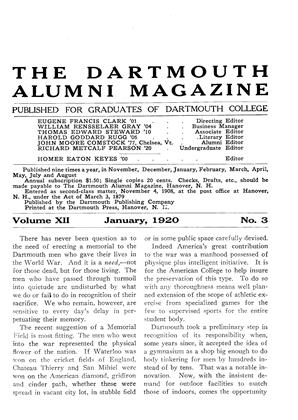Undergraduate political sentiment at Dartmouth is overwhelmingly Republican according to the results of a straw vote cast December 11 and 12 at the instigation of The Dartmouth. Of a total vote of 1073, Republican candidates polled 863, Democratic possibilities polled 174, and Non-Partisans 36. The names voted on were those of men mentioned as possible candidates for the presidency of the United States in 1920.
Leonard Wood with 271 votes and Woodrow Wilson with 68 were the leading vote getters of the Republican and Democratic parties respectively; but President Wilson's position on the actual list of results was fifth. Four Republicans, Wood, Coolidge, Hughes, and Lowden, each polled more votes than Mr. Wilson.
Each undergraduate was restricted to voting for one candidate, and none was privileged to vote in the "primaries" of more than one party. McAdoo, Baker and Clark were the Democrats who drew most student votes, after President Wilson. But a fifth Republican, Hiram Johnson, came in sixth, just between the president and the former secretary-director general.
The tabulated vote stood thus:—
Leonard Wood (R) 271 Calvin Coolidge (R) 260 Charles E. Hughes (R) 130 Frank C. Lowden (R) 123 Woodrow Wilson (D) 68 Hiram Johnson (R) 64 William G. McAdoo (D) 54 Herbert Hoover (Non-part) 32 Newton D. Baker (D) 16 Warren G. Harding (R) 15 Champ Clark (D) 14 A. Mitchell Palmer (D) 14 Oscar Underwood (D) 6 John J. Pershing (Non-part) 4 Thomas R. Marshall (D) 2 Total vote 1073 Republican vote 863 Democratic vote 174 Non-partisan vote 36
The tables must be read in light of the knowledge that Dartmouth College draws more students from Calvin Coolidge's state, Massachusetts, than from any other; next most from New York, the home of Charles Evans Hughes, and many from northern New England, which claims General Wood. He was born in New Hampshire and is now considered a Massachusetts man. The increased number of undergraduates from the Middle West is reflected, probably, in the vote of 123 given Governor Lowden of Illinois. Somewhat the same deduction can be made from the vote for Champ Clark, of whom only slight mention for the 1920 presidency has been heard.
 View Full Issue
View Full Issue
More From This Issue
-
 Article
ArticleMY GENERATION
January 1920 By Charles Darwin Adams -
 Article
ArticleThere has never been question as to the need of erecting a memorial to the Dartmouth
January 1920 -
 Article
ArticleDARTMOUTH MEN ACTIVE IN WEST
January 1920 -
 Class Notes
Class NotesCLASS OF 1919
January 1920 By Max A. Norton -
 Class Notes
Class NotesCLASS OF 1919
January 1920 By Max A. Norton -
 Class Notes
Class NotesCLASS SECRETARIES
January 1920
Article
-
 Article
ArticleAt the April 3 dinner meeting in New York
MAY 1963 -
 Article
ArticleThe Image of Science
OCTOBER 1997 -
 Article
ArticleSCRAPS OF EARLY DARTMOUTH HISTORY
By Levi Frisbie -
 Article
ArticleA Stranger in the House
MAY 1985 By Margaret Robinson -
 Article
ArticleWithin These Walls
March 1941 By R. H. Britton Jr. '42 -
 Article
ArticleStatement of Ownership, Management and Circulation (Required by 39 U.S.C. 3685).
Nov/Dec 2010 By Sean Plottner

